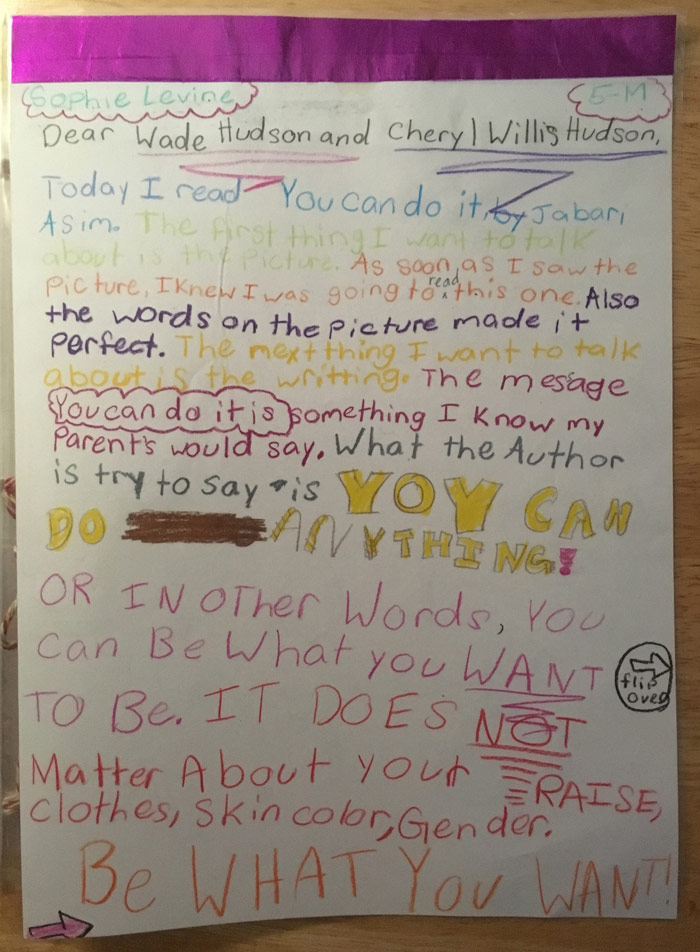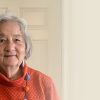For decades there has been a lack of choices for books featuring diverse characters created by diverse authors and illustrators. In response, We Need Diverse Books (WNDB) was created to bring equality in representation to children’s book publishing. However, before WNDB, there were organizations and people standing up and leading the way. Two of those people were Wade Hudson and his wife, Cheryl Willis Hudson, of Just Us Books. In this interview with Mackin, the Hudsons share their history, their mission, their passion, and their hope with readers.
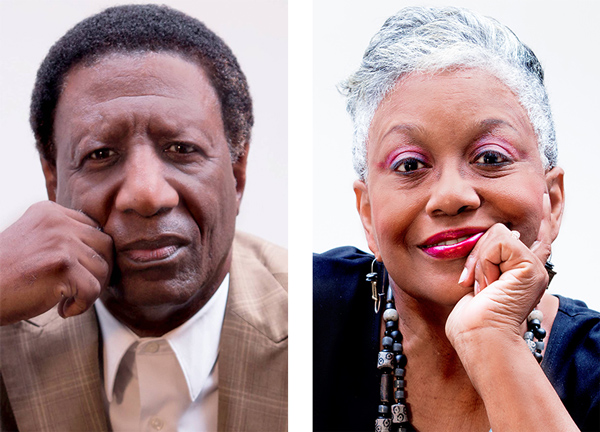
Thirty years ago, you decided to found Just Us Books, one of the few Black-owned, independent book publishers dedicated to producing books for Black children featuring Black characters and culture. These were books that you wanted for your children but couldn’t find. What were you seeking?
Wade Hudson (WH): When we were growing up in the segregated South, we didn’t have books written by Black writers, or books that explored Black experiences, history, and culture. In my school library, there were several biographies. I believe they were about Booker T. Washington and George Washington Carver. That was it. But I enjoyed reading and learning though literature and history. So I read a lot . . . classics such as A Tale of Two Cities, Last of the Mohicans, Moby Dick. I read biographies and excerpts from novels that were incorporated in our English textbooks. It wasn’t until I attended college that I discovered Black writers such as Langston Hughes, Richard Wright, Gwendolyn Brooks, W. E. B. Du Bois, and all the wonderful, important works they and other Black writers had produced. Having access to these works in which I could read about experiences to which I could relate, about the history of my people, changed me profoundly. That’s when I began to believe that I, too, could be a writer.
“All children need to see themselves reflected in the books they read.”
— Wade Hudson
When our daughter was born, we started looking for books for her. We found very few that had characters who looked like her. Yes, there were books written by Walter Dean Myers, Eloise Greenfield, Virginia Hamilton, Patricia McKissack, and a few other writers of color, but essentially, children’s book publishing hadn’t changed much. An article written by Nancy Larrick in 1965, entitled “The All-White World of Children’s Books,” sounded the alarm about the need for inclusivity in the industry. But this call to action and the organized efforts of children’s book creators of color and others who recognized the need for changes opened the door for only a handful of authors and illustrators. According to the Cooperative Children Book Center at the University of Wisconsin, in 1985, three years before we launched Just Us Books, of the 2,500 trade books published, only 18 were created by African Americans. So starting our company, whose mission is to publish books for children and young adults that focus on Black history, culture, and experiences, was a no-brainer for us. All children need to see themselves reflected in the books they read. We wanted to make a difference when we started our company.
Publishing has come a long way in thirty years, with the offering of books featuring diverse characters and illustrations as well as books by diverse authors and illustrators. Do you believe we have finally arrived at a place where balance has been achieved? What are the successes, and is there still room for growth and improvement?
Cheryl Willis Hudson (CH): Let’s talk about the successes first. In recent years, indigenous people and people of color have won Caldecotts, Newberys, Pura Belprés, Coretta Scott Kings, Siberts, ALA Notables, National Book Awards, and a variety of other honors. They have held ambassadorships in young people’s literature; they have expanded the children’s literature canon, nationally and internationally. But this should have been happening all along. Within the last four years, the Kweli Conference has embraced hundreds of emerging IPOC authors and illustrators, and their voices need to be published and heard. The book world has come a long way, but it started so far behind. There is an awful lot of work that still needs to be done to engage, hire, and retain IPOC personnel within the industry, so there’s lots of room for growth and improvement. Racial stereotypes, privilege, and racism are still deeply embedded in children’s literature, and it takes vigilance and persistence to root them out.
“There are more awards, more recognition of the talents of people of color, but a lot more work needs to be done to achieve equity.”
— Cheryl Willis Hudson
As pioneers in creating not only Black-interest books but also a publishing company, you have lived that “vigilance and persistence” you speak of. What strides have you seen over the years?
CH: Just Us Books incorporated as a publishing company in 1988, but a number of strides had been taken by individuals before that time. Changes in the canon have been gradual since the 1965 publication of Nancy Larrick’s essay, but in 2019 there’s still quite a lot of work to do.
Wade and I started our journey into publishing as authors during the 1970s, when only a handful of Black authors or illustrators were represented in the industry. That early list included Virginia Hamilton, Walter Dean Myers, Mildred Taylor, Eloise Greenfield, Tom Feelings, Jerry Pinkney, George Ford, and a few others. Organizations such as the Council on Interracial Books for Children (established during the mid-1960s), Black Creators for Children (mid-1970s), and Black Women in Publishing (late 1970s) were instrumental in advocating for more diversity within the industry. The Coretta Scott King Award was first established in 1970, and it had a huge impact in making African American literature more visible, particularly within the library community. Ebony Jr! magazine (published by Johnson Publications in the late 1970s) was a monthly magazine that introduced more children’s stories to Black consumers, but book publishing companies devoted to Black literature for children didn’t really exist.
The larger commercial children’s publishers may have had only one or two titles on their lists and probably even fewer or no employees among people of color. Gradually, the color and content of the canon have changed. There are more awards, more recognition of the talents of people of color, but a lot more work needs to be done to achieve equity.
“People of color must have the right and the chance to tell their own stories.”
— Wade Hudson
Let’s talk about We Need Diverse Books which has become a well-recognized movement within the publishing world. Do you participate in that organization?
CH: We have always participated in a number of efforts to increase diversity and to advocate for equity within the children’s literature community. During the 1990s, Just Us Books was active in an organization called the Multicultural Publishers Exchange (MPE), which was a precursor to WNDB. Our membership included African, Latinx, Asian, Indigenous, and LGBTQ Americans. We participated in book fairs and held conferences in an effort to support each other’s efforts to have a more collective voice within the publishing industry. Just Us Books was also involved in an organization of Black publishers known as NABBP (National Association of Black Book Publishers), which participated in Book Expo (then known as American Booksellers Association) and in PEN America. The fact that an organization like WNDB emerged a few years ago (twenty-some years after MPE was established) illustrates that combating stereotypes and establishing Own Voices in the struggle continues. WNDB has done a tremendous job in promoting diversity and inclusion in the industry. We have supported many of their efforts.
Lately the need for authentic voice has become recognized. Will you share your thoughts on authentic voice?
WH: Own Voices, which is the term that is used to describe authentic voices, is so crucial. Unfortunately, people of color have had very few opportunities to write stories about their experiences, culture, and history. People of color must have the right and the chance to tell their own stories. When Freedom’s Journal, the first Black newspaper in the United States, was published in 1827, John Russwurm and Samuel Cornish wrote in their editorial, “We wish to plead our own cause. Too long have others spoken for us. Too long has the publick been deceived by misrepresentations, in things which concern us dearly.” That assertion is as true today as it was in 1827. When given the opportunity, writers and illustrators of color have produced wonderful work that is representative of their culture and history. It is inspiring, and it resonates within the general market. Some of the best children’s literature being produced today is coming from the pen and brush of people of color.
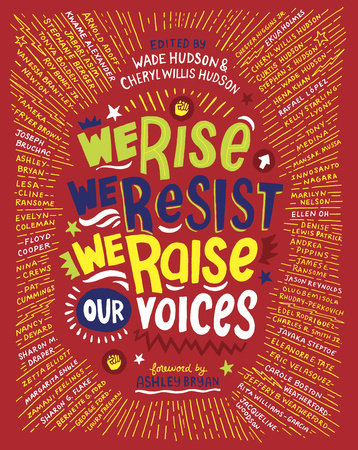 Last fall your anthology We Rise, We Resist, We Raise Our Voices (Crown Books for Young Readers, 2018) was released. It is a compilation featuring the work of leading diverse authors and illustrators such as Ashley Bryan, Kwame Alexander, and Jacqueline Woodson. What was the process of creating the collection?
Last fall your anthology We Rise, We Resist, We Raise Our Voices (Crown Books for Young Readers, 2018) was released. It is a compilation featuring the work of leading diverse authors and illustrators such as Ashley Bryan, Kwame Alexander, and Jacqueline Woodson. What was the process of creating the collection?
WH: We Rise, We Resist, We Raise Our Voices came together rather quickly. The idea was born in November 2016, following the presidential election. We knew there were other children’s and young adult book creators who felt the same as we did about what was taking place, so we decided to do an anthology and allow them to share their thoughts and stories which we felt would help to encourage our young and offer them love and support and hope for the future.
In January, we drafted a proposal and started sending it to the authors and illustrators we had targeted. The response was phenomenal. By May 2017, we had contracts signed with more than sixty percent of the contributors, and many of those had sent us their contribution. At Book Expo that year, I ran into Phoebe Yeh, VP and Editorial Director at Crown Books for Young Readers, whom Cheryl and I have known for decades. She asked what we were doing at Just Us Books. I told her about the anthology and she was very excited. After several meetings, we decided a partnership with Crown would enhance the creative potential as well as market penetration. As you know, We Rise, We Resist, We Raise Our Voices was officially released in September 2018. So it took about a year and a half to publish it.
“We just want to make a difference, not only in publishing but in the lives of children and in our communities.”
— Wade Hudson
Another project was your Poetry from the Masters series which features a brief narrative about a Black poet’s life and examples of his or her poems. How did you come up with this project and how many books do you expect to publish in this series?
WH: Well, I wanted to produce a book that was accessible and engaging, and which provided essential information about each poet. I thought it was important to place each poet in their proper historical time and context. What was happening during their lifetime? What role did the poet play in those events? Being armed with this kind of information offers an opportunity to not only enjoy the poetry, but to appreciate the poetry’s importance beyond the world of literature. The second book in the series, Poetry from the Masters: The Black Arts Movement (Just Us Books, 2014) followed the same format. Actually, it was similar to the approach I used in writing the Book of Black Heroes from A to Z (Just Us Books, 1994). 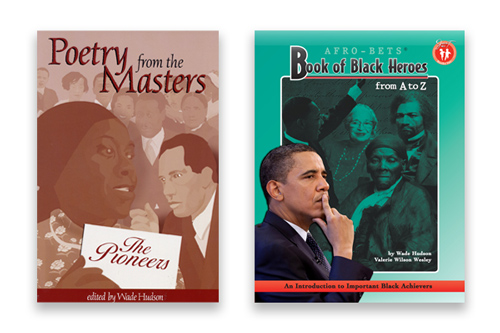
Is AFRO-BETS Book of Black Heroes from A to Z one of the first books you published?
CH: AFRO-BETS ABC Book (Just Us Books, 1987) was actually our first published title, followed by the AFRO-BETS 123 Book (Just Us Books, 1987), and then the Book of Black Heroes from A to Z. We felt very strongly that the AFRO-BETS Kids embody a variety of personalities, hairstyles, skin tones, clothes, and interests. Using Afrocentric letters, numbers, and words was a creative way to introduce readers to a diverse group of characters within African American culture.
In 2013, you published a revised edition of Black Heroes witha few new entries like former President Barack Obama. Do you anticipate creating more editions?
CH: The series expanded from an alphabetical listing, and now there are three other books in the Heroes series: Great Women in the Struggle (Just Us Books, 2018), Scientists, Healers and Inventors (Just Us Books, 2013),and Political Leaders, Past and Present (Just Us Books, 2017).
In addition to these works, you have written and published other stories such as My Friend Maya Loves to Dance (Harry N. Abrams, 2010), narrated from the perspective of a girl in a wheelchair, and From Where I Stand in the City (Marimba, 2008). Where did these story ideas come from?
CH: Many of my book ideas come from childhood and family experiences. Bright Eyes, Brown Skin (Just Us Books, 1987) was inspired over thirty years ago by the birth of our son. But my joy in observing the individual features of our baby boy was transformed into a totally different preschool adventure of four children interacting with one another once the illustrator, George Ford, interpreted the manuscript. From Where I Stand took its cue from observing small children in strollers being escorted by their working mothers and caretakers on New York City subways. I wondered what that experience would be like from the point of view of a child. The inspiration for My Friend Maya initially came from my own memories of taking ballet lessons as a child. But Eric Velasquez added an even deeper perspective when he illustrated the storyteller in a wheelchair, and his illustrations are brilliant! Making picture books is such a collaborative effort, and the perspective of the illustrator is just as crucial as any wordsmithing of the text.
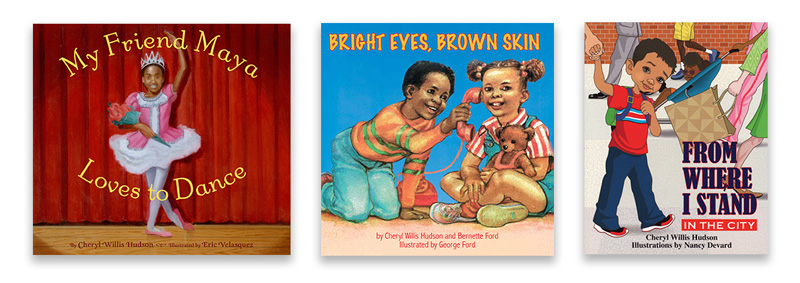
On your website, you feature a Teacher and Librarian Center full of downloadable resources to accompany your books. One very interesting resource is the educators’ guide on encouraging boys to read. What inspired you to create it?
WH: Early on we recognized that some parents and educators were having problems getting boys to read. We were also aware of the statistics that show the correlation between the inability to read and school dropout and penal incarceration rates. At Just Us Books, we have made special efforts to publish books that appeal to boys, especially young Black boys. Series such as Kid Caramel, which features a Black boy detective and his sidekick, and picture books such as Jamal’s Busy Day (Just Us Books, 1991), and the AFRO-BETS Kids series, feature Black boy characters prominently positioned on the covers. We are elated when we see boys rush to pick up those books. In addition, I have conducted workshops and done presentations where I share tips and suggestions that can be instrumental in helping boys become readers. We offer teachers’ guides for most of our books. These resources provide teachers and parents with valuable information to help them explore each book.
Connect With Just Us Books
What can readers look forward to seeing from Just Us Books in the future?
CH: We continue to focus our publishing program on picture books and books for middle readers, and we’re excited about that. Together we are co-editing another middle-grade anthology. I’ve just finished a middle-grade biography of important Black women, and I’ve begun an artist book of my story quilts. Wade is working on several personal projects, including a memoir. He has just finished a collection of his poems that will be published for the adult market. It’s a bit of a juggling act, but we still manage to balance our personal projects with our company’s overall publishing program.
We enjoy interacting with students when we do school visits. We also maintain an active presence on social media and find that we reach an interested audience of adults as well as young people via podcasts, as well as Facebook, Instagram, and Twitter.
When you decide to set work aside, what do you hope your legacy will be?
WH: We just want to make a difference, not only in publishing but in the lives of children and in our communities. It is not only through our books that we can accomplish that; it is during school visits and speaking engagements to community groups and organizations, and by being advocates for a better world for all of us.
Meet the Hudsons
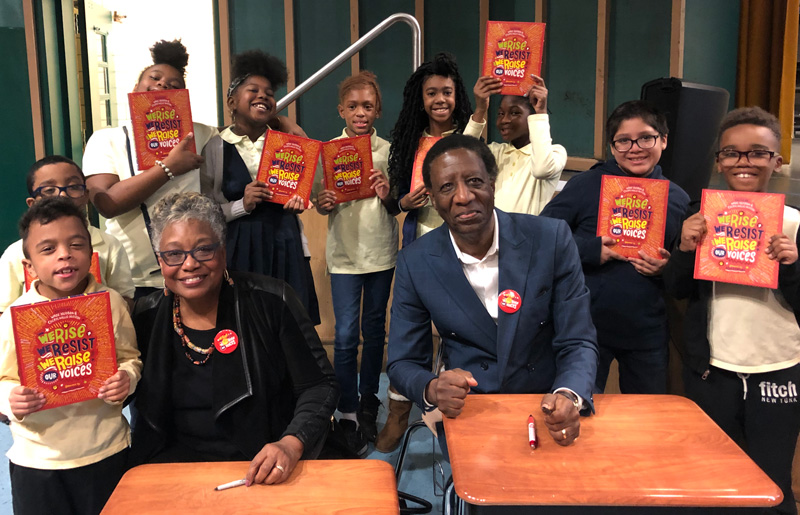
Cheryl Willis Hudson and Wade Hudson with a group of students.
Wade Hudson
Wade Hudson majored in political science at Southern University. After his involvement in the civil rights movement of the 1960s, he worked as a newspaper reporter, playwright, and public relations specialist. He currently serves as President and CEO of Just Us Books, a pioneer in children’s as well as multicultural publishing. As a publisher, author, and advocate of diversity in literature, Hudson offers a unique perspective to young people and adults during school visits, panels, workshops, and other events. He and his wife, Cheryl, also created and facilitated a workshop for the Freedom Schools, operated by the Children’s Defense Fund. Wade has authored many books for young readers, including Book of Black Heroes from A to Z, Jamal’s Busy Day, Poetry From The Masters:The Pioneers, Book of Black Heroes: Scientists, Healers and Inventors, Powerful Words: More Than Two Hundred Years of Extraordinary Writing by African Americans, It’s Church Going Time, Feelings I Love to Share, and Friends I Love to Meet.
Cheryl Willis Hudson
Cheryl Willis Hudson is a graduate of Oberlin College in Ohio, and began her career doing textbook design for publishers such as Houghton Mifflin and Macmillan. Currently she is vice president and editorial director of Just Us Books that she founded with her husband to address the need for more African American children’s books in the market place. Willis Hudson has more than 40 years of experience in the children’s book industry and has authored many books for young children including Bright Eyes, Brown Skin, AFRO-BETS ABC Book, AFRO-BETS 123 Book, Many Colors of Mother Goose, Come By Here Lord: Everyday Prayers for Children, Good Morning, Baby (Scholastic), From Where I Stand (Marimba Books), Hands Can (Candlewick Press), and My Friend Maya Loves to Dance (Abrams Books for Young Readers).

